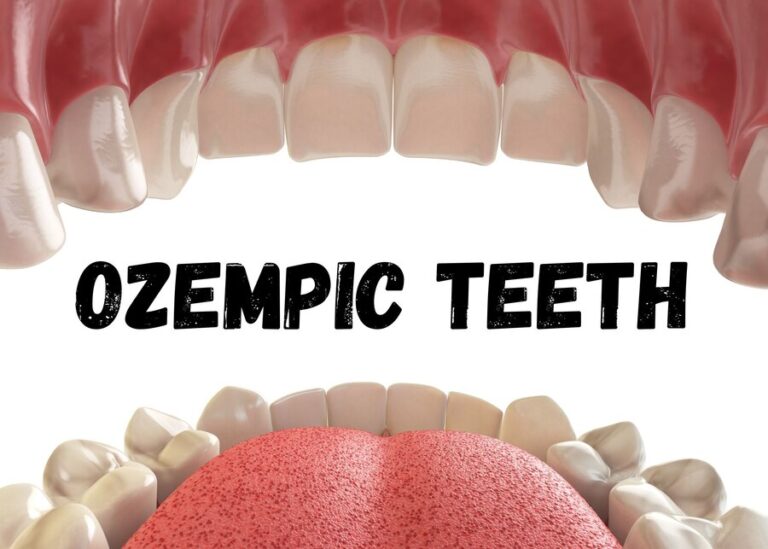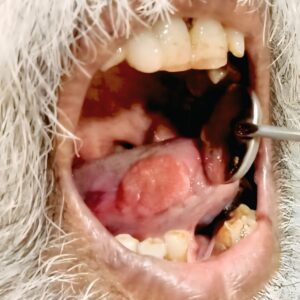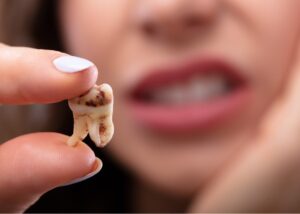
Ozempic Teeth Alert - Essential dental care tips that cannot be neglected
Introduction to OZEMPIC TEETH
If you are treating diabetes using Ozempic, chances are that you are only considering one component of your health: blood sugar levels. While this medication has proven very effective at controlling glucose levels, it has also shown unexpected side effects including Ozempic teeth. When discussing Ozempic teeth, it’s essential to understand its full scope as many users have reported dental issues attributed to treatment with Ozempic.
Understanding the relationship between Ozempic and oral health is critical for maintaining that bright smile you deserve. In this blog post, we’ll cover how Ozempic affects your teeth, common dental problems associated with its use, tips to maintain oral hygiene effectively and much more – let’s dive into Ozempic teeth care world!

Table of Contents
Common dental issues result from OZEMPIC
1. DRY MOUTH
OZEMPIC can lead to numerous dental issues. While effective at managing blood sugar levels, OZEMPIC may result in several dental issues for users. Many users report experiencing dry mouth, an issue in which saliva production decreases significantly and neutralizing acids becomes harder; as a result, food particles remain trapped between your teeth for too long without washing away properly with saliva production; this side effect of Ozempic may increase your risk of cavities if not managed appropriately; remaining hydrated and using saliva substitutes could help minimize these risks associated with OZEMPIC teeth.
2. Gingivitis
Another potential risk associated with OZEMPIC is gum sensitivity or inflammation. Users may notice their gums bleed more readily during brushing or flossing sessions and this irritation could worsen over time if left unmanaged.
3. Changed Taste Perception
Additionally, some individuals experiencing OZEMPIC may notice changes to their sense of taste perception that may impact dietary decisions and lead to poor nutrition habits that impact oral health adversely. This change could negatively influence diet choices which in turn impact oral health negatively.
Awareness of this medication’s side effects is important in order to prioritize appropriate dental health.
Tips for Maintaining Proper Oral Hygiene While on OZEMPIC
- Maintaining proper dental health requires diligent oral hygiene practices while on OZEMPIC. Establish a regular brushing schedule twice daily using fluoride toothpaste in order to strengthen enamel and avoid decay.
- Remind yourself to floss daily! Doing this helps remove plaque from between teeth, which reduces risk of gum disease that could be worsened by medications like OZEMPIC.
- Consider using an antimicrobial mouthwash as well, to help fight bacteria that causes bad breath and other dental issues. This will prevent bad breath as well as any related dental complications from happening.
- Stay hydrated throughout your day to combat dry mouth caused by OZEMPIC diabetes medication, so drinking water regularly will keep saliva production up and prevent dryness in the mouth.
- Keep a close eye on any changes to your oral health, such as any signs of discomfort. Address it right away by consulting with your dentist.
The importance of regular dental check-ups for OZEMPIC users
- OZEMPIC users must undergo regular dental check-ups as this medication may cause various dental issues that need to be managed, so preventive dental check-ups are key in staying ahead of potential issues.
- Consultations with your dentist every six months can provide early detection and intervention of decay or gum disease caused by changes in saliva production or oral health issues associated with OZEMPIC.
- At these appointments, professionals provide tailored advice for maintaining optimal oral hygiene. They may suggest products and techniques tailored specifically to OZEMPIC participants’ challenges.
- Your dentist may recommend more frequent cleanings if they detect risks associated with your treatment, especially as OZEMPIC makes diabetes management simpler for you. Regular visits ensure both teeth and gums stay healthy as you navigate this journey.
Dietary Changes for Protecting Teeth on OZEMPIC
- Making wise dietary choices while on OZEMPIC is essential to maintaining oral health. Reduce sugary snacks and beverages which could lead to decay; switch to fresh fruits and vegetables which naturally promote oral wellbeing instead.
- Include calcium-rich foods like yogurt and leafy greens into your meals to strengthen tooth enamel and counteract any potential negative side effects of medication on dental health.
- Staying hydrated throughout the day with water can not only flush away food particles but also promote saliva production which is key for neutralizing acids in your mouth.
- Be wary of acidic foods such as citrus fruits or tomatoes; while healthy, too much acidity may erode enamel if consumed regularly. Balance acidic food consumption with alkaline alternatives in order to maintain a stable pH balance within your mouth.
- Consider using a straw when drinking anything potentially harmful, to prevent direct contact between it and your teeth. Even small changes can have big results!
Alternative Diabetes Therapies that Don't Cause Ozempic Teeth
- For those concerned about how OZEMPIC might impact oral health, there are other medications and treatments available that could be gentler on their teeth.
- Metformin is a popularly prescribed option, helping manage blood sugar without many of the adverse side effects associated with other diabetic medications, and without having a negative impact on dental health.
- Canagliflozin and empagliflozin may provide viable alternatives. These medications work by helping the kidneys remove glucose from the bloodstream, maintaining stable blood sugar levels without jeopardizing oral hygiene.
- Lifestyle changes that include adopting a balanced, high fiber diet and engaging in regular physical activity can significantly help manage diabetes, while safeguarding teeth from potential medication side-effects.
- Before making any adjustments to your treatment plan, always consult healthcare professionals first – they can advise on options tailored specifically for you.
Conclusion
- Maintaining oral health is paramount in managing diabetes with OZEMPIC, but the links between diabetes and dental issues cannot be underestimated.
- Prioritizing dental health can result in improved overall health outcomes. By including effective dental hygiene practices into your daily routine, you can reduce potential risks associated with OZEMPIC use.
- Regular visits to your dentist should be part of your plans; these appointments help identify any potential issues early before they escalate into more serious concerns.
- Adopting diet changes can aid both blood sugar control and tooth protection. Being mindful about what you eat not only supports managing diabetic conditions but also promotes healthier teeth and gums.
- Maintaining healthy ozempic teeth requires practicing excellent oral hygiene practices. Brushing, flossing, and using mouthwash should become part of your daily regimen if taking this medication.








